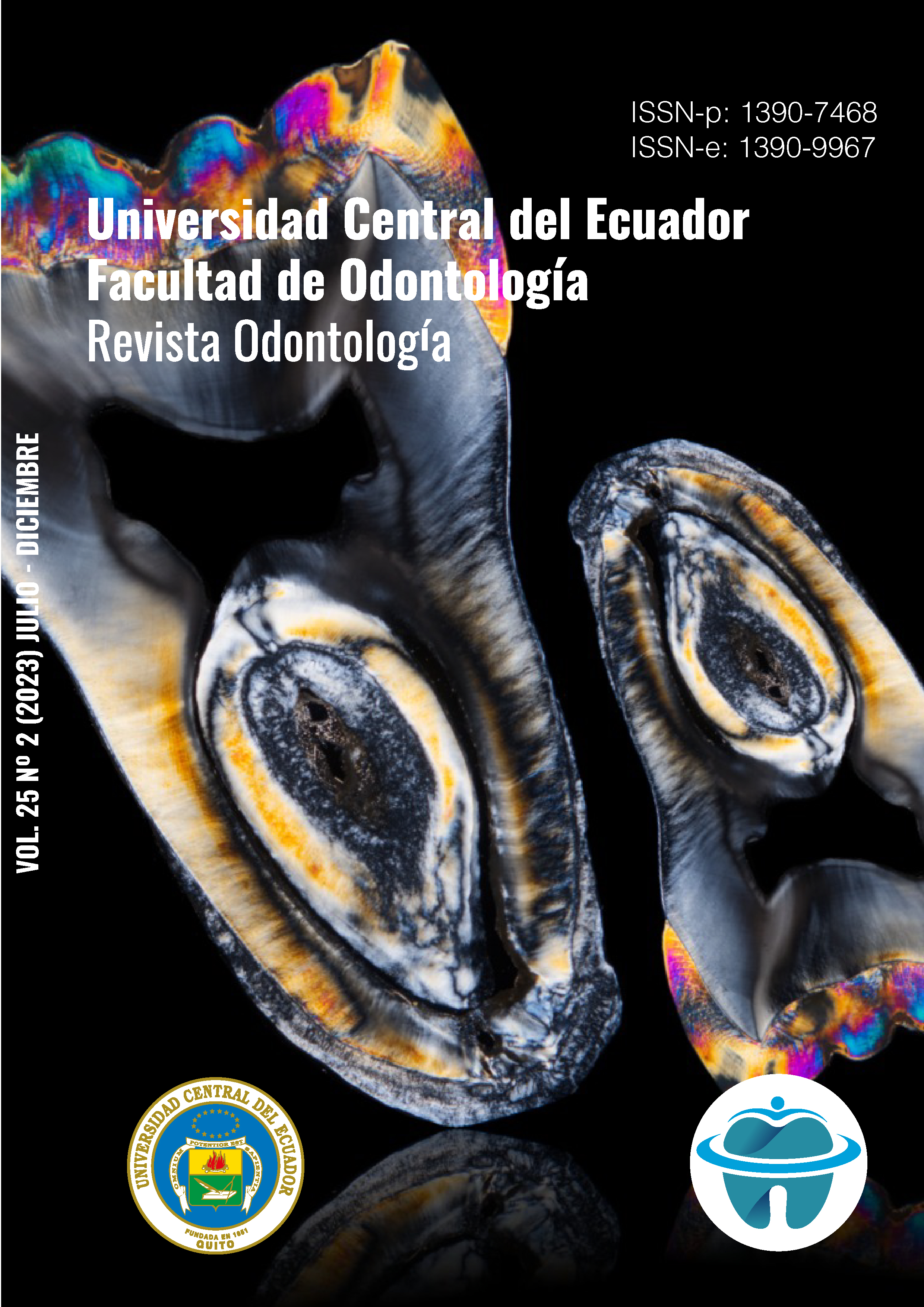Self-perception of parents to the multidisciplinary treatment of children served at the cleft lip and palate clinic of UCACUE
DOI:
https://doi.org/10.29166/odontologia.vol26.n2.2023-e4151Keywords:
self-perception, cleft lip and palate, clinical protocol, parentsAbstract
Introduction: The second most frequent congenital malformation is cleft lip and palate. Parents need advice on the management and multidisciplinary treatment plan that will accompany them throughout childhood and adolescence. Objective: To identify parents' self-perception of their children's multidisciplinary treatment at the Cleft Lip and Palate Clinic of the UCACUE. Material and Methods: A descriptive, cross-sectional, documentary-type study was carried out using surveys of the representatives of children and adolescents attended at the Cleft Lip and Palate Clinic of the UCACUE, with a population of 64 parents selected according to the inclusion and exclusion criteria. Results: 61% of parents consider that their children's condition significantly impacts their children's social and educational environment, 59% do not know anything about the manual for cleft lip and palate treatment, and 48.4% consider themselves anxious during their children's consultation. Conclusion: 58% of parents perceive an improvement in the treatment of their children in the Cleft Lip and Palate Clinic of UCACUE.
Downloads
References
Bedón Rodríguez M, Villota González L. LABIO Y PALADAR HENDIDO: TENDENCIAS ACTUALES EN EL MANEJO EXITOSO. Archivos de Medicina (Col). 2012 enero- junio; 12(1): p. 107-119.Disponible en https://www.redalyc.org/pdf/2738/273824148010.pdf
Cazar Almache M, Campos Ramírez L, Pineda D, Guillén P. Panorama epidemiológico de la fisura labiopalatina en Quito, Guayaquil y Cuenca. Ecuador, 2010-2018. Acta Odont Col. 2020; 10(1): p. 37-46. Disponible en: https://www.redalyc.org/journal/5823/582362326004/html/
Reinoso Quezada SJ, Maldonado Romero JA, Campoverde Arce CA. Factores que afectan la autopercepción de los niños con labio y paladar fisurado. Articulo de revision autopercepción de niños con LPF. Odontología. 2021 enero; 23(1): p. e2670. Disponible en: https://revistadigital.uce.edu.ec/index.php/odontologia/article/view/2670
Monasterio L, Ford A, Tastets M. FISURAS LABIO PALATINAS TRATAMIENTO MULTIDISCIPLINARIO CLEFT LIP AND PALATE. MULTIDISCIPLINARY TREATMENT. REV. MED. CLIN. CONDES. 2016 Octubre; 27(1): p. 14-21. Disponible en: https://www.elsevier.es/es-revista-revista-medica-clinica-las-condes-202-articulo-fisuras-labio-palatinas-tratamiento-multidisciplinario-S0716864016000043.
Palacios Vivar D, Alvear Córdova MC, Alvarado Cordero A, Reinoso Quezada S. Atención integral del paciente con labio y paladar fisurado Integral Treatment of pacients with cleft lip and palate. OACTIVA UC Cuenca. 2020 Mayo- Agosto; 5(2): p. 27-30. Disponible en: https://oactiva.ucacue.edu.ec/index.php/oactiva/article/view/462.
Lombardo-A. La intervención del pediatra en el niños con labio y paladar hendido. Acta Pediatr Mex. 2017 jul 267-273; 38(4). Disponible en: https://www.medigraphic.com/pdfs/actpedmex/apm-2017/apm174f.pdf
Ford M A. Tratamiento actual de las fisuras labio palatinas. Rev.Med.Clin.Condes. 2004 Enero 3-11; 15(1). Disponible en: http://www.clc.cl/clcprod/media/contenidos/pdf/MED_15_4/TratamientoLabiopalatinas.pdf
Limiñana Gras RM, Corbalán Berná J, Patró Hernández R. Afrontamiento y adaptación psicológica en padres de niños con fisura palatina. Anales de psicología. 2007 Diciembre; 23(2): p. 201-206. Disponible en: https://www.redalyc.org/pdf/167/16723204.pdf
Hlongwa PRL. "People look and ask lots of questions": caregivers' perceptions of healthcare provision and support for children born with cleft lip and palate. BMC Public Health. 2018 Apri; 18(1): p. 506. Disponible en: https://bmcpublichealth.biomedcentral.com/articles/10.1186/s12889-018-5421-x.
Cordero R, Silva -Vetri M, Botero T. Educación comunitaria: impacto familiar y social en la aparición y manej de labioy/o paladar hendido. Revista Aula. 2017 julio- diciembre ; 61(1). Disponible en: https://repositorio.unphu.edu.do/handle/123456789/773?show=full
San Martín V, Osorio X. Experiences of parents of children with cleft lip palate regarding care in the different stages of surgical treatment. Enfermería: Cuidados Humanizados. 2021 Enero -Junio; 10(1): p. 44-59. Disponible en: http://www.scielo.edu.uy/scielo.php?pid=S239366062021000100044&script=sci_arttext&tlng=en. DOI: https://doi.org/10.22235/ech.v10i1.2411
Kuttenberger JOJ, Polska E. Initial counselling for cleft lip. Int. J. Oral Maxillofac. Surg. 2010; 39: p. 214-220. Disponible en: https://pubmed.ncbi.nlm.nih.gov/20079610/.
Gkantidis N, Papamanou DA, Christou P, Topouzelis N. Aesthetic outcome of cleft lip and palate treatment. Perceptions of patients, families, and health professionals compared to the general public. Journal of Cranio-Maxillofacial Surgery. 2013; 41(7): p. e105-e110. Disponible en: https://www.sciencedirect.com/science/article/abs/pii/S1010518212002739?via%3Dihub.
Feragen KB, Semb G, Heliövaara A, Lohmander A, Johannessen EC, Boysen BM, et al. Scandcleft randomised trials of primary surgery for unilateral cleft lip and palate: 10. Parental perceptions of appearance and treatment outcomes in their 5-year-old child. Journal of Plastic Surgery and Hand Surgery. 2017; 51(1): p. 81-87. Disponible en: https://pubmed.ncbi.nlm.nih.gov/28218558/.
Published
How to Cite
Issue
Section
License
Copyright (c) 2023 Estefanía Dayanna Rodríguez Mogrovejo, Santiago José Reinoso Quezada

This work is licensed under a Creative Commons Attribution-NonCommercial-NoDerivatives 4.0 International License.


